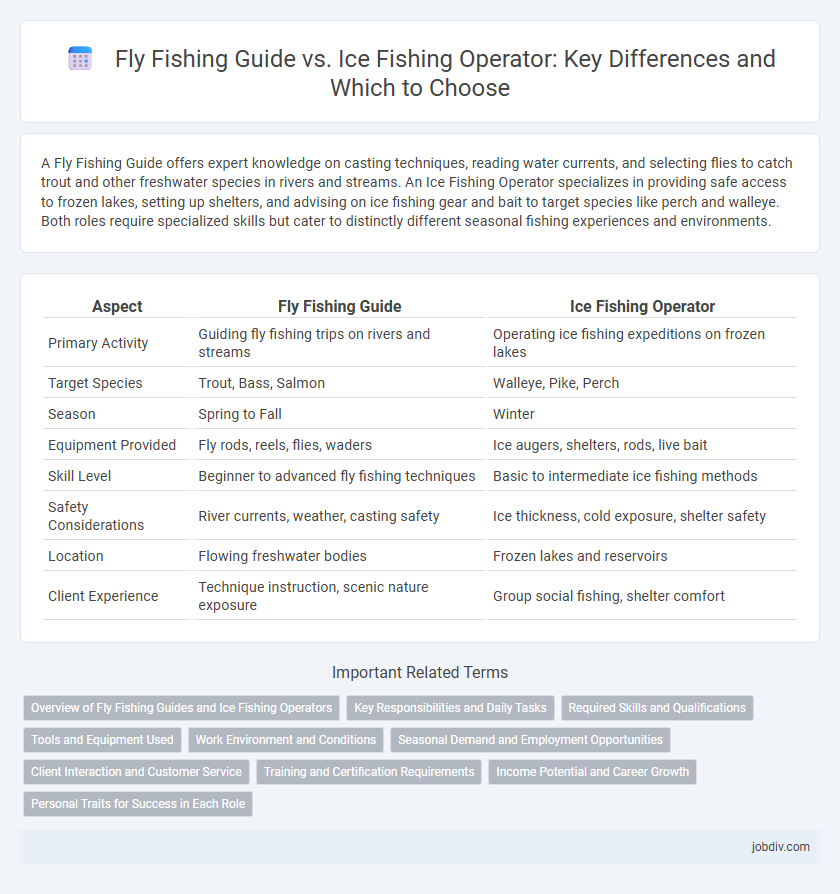A Fly Fishing Guide offers expert knowledge on casting techniques, reading water currents, and selecting flies to catch trout and other freshwater species in rivers and streams. An Ice Fishing Operator specializes in providing safe access to frozen lakes, setting up shelters, and advising on ice fishing gear and bait to target species like perch and walleye. Both roles require specialized skills but cater to distinctly different seasonal fishing experiences and environments.
Table of Comparison
| Aspect | Fly Fishing Guide | Ice Fishing Operator |
|---|---|---|
| Primary Activity | Guiding fly fishing trips on rivers and streams | Operating ice fishing expeditions on frozen lakes |
| Target Species | Trout, Bass, Salmon | Walleye, Pike, Perch |
| Season | Spring to Fall | Winter |
| Equipment Provided | Fly rods, reels, flies, waders | Ice augers, shelters, rods, live bait |
| Skill Level | Beginner to advanced fly fishing techniques | Basic to intermediate ice fishing methods |
| Safety Considerations | River currents, weather, casting safety | Ice thickness, cold exposure, shelter safety |
| Location | Flowing freshwater bodies | Frozen lakes and reservoirs |
| Client Experience | Technique instruction, scenic nature exposure | Group social fishing, shelter comfort |
Overview of Fly Fishing Guides and Ice Fishing Operators
Fly fishing guides specialize in river and stream environments, offering expertise in casting techniques, insect hatches, and trout behavior to enhance the angler's experience. Ice fishing operators provide services tailored to frozen lakes, including shelter setup, safety equipment, and knowledge of ice conditions and species like walleye and perch. Both professionals offer valuable local insights but cater to distinctly different fishing methods and seasonal conditions.
Key Responsibilities and Daily Tasks
Fly fishing guides specialize in teaching casting techniques, identifying aquatic insect hatches, and navigating rivers to locate optimal fishing spots. Ice fishing operators focus on setting up ice shelters, drilling holes through thick ice, and maintaining safety protocols in freezing conditions. Both roles require expertise in fish behavior, equipment handling, and providing customer support, but differ significantly in environment-specific skills and daily operational tasks.
Required Skills and Qualifications
Fly fishing guides must possess in-depth knowledge of aquatic insect life cycles, advanced casting techniques, and the ability to read water currents to effectively assist anglers. Ice fishing operators require expertise in ice safety protocols, proficiency in setting up shelters and drilling equipment, and strong skills in fish species identification under harsh weather conditions. Both roles demand excellent communication skills, certifications in first aid, and practical experience in angling methods specific to their environments.
Tools and Equipment Used
Fly fishing guides rely on lightweight rods, specialized fly reels, and artificial flies crafted to mimic insects, combined with waders and polarized sunglasses for optimal water visibility. Ice fishing operators utilize sturdy ice augers, insulated shelters, tip-ups, and heavy-duty rods designed for cold conditions and deep hole fishing through frozen lakes. Both professions employ technology like fish finders and GPS units to enhance site location and fish detection efficiently.
Work Environment and Conditions
Fly fishing guides work primarily in flowing freshwater environments such as rivers and streams, often facing variable weather conditions and physical demands like wading in cold water for extended periods. Ice fishing operators operate in freezing temperatures on ice-covered lakes, managing ice safety and equipment setup while enduring harsh winter weather and potential exposure to extreme cold. Both roles require specialized knowledge of local ecosystems but differ significantly in seasonal challenges and environmental stressors.
Seasonal Demand and Employment Opportunities
Fly fishing guides experience peak demand during spring and summer months when rivers teem with trout and salmon, offering abundant employment opportunities in regions with vibrant freshwater ecosystems. Ice fishing operators see heightened seasonal demand in winter as frozen lakes attract anglers seeking species like walleye and pike, creating niche job markets in colder climates. Both roles require strong knowledge of local fish behavior and environmental conditions, but employment opportunities fluctuate significantly based on seasonal access and weather patterns.
Client Interaction and Customer Service
Fly fishing guides prioritize personalized client interaction by offering tailored casting techniques and fly selection advice, enhancing the angler's experience on rivers and streams. Ice fishing operators focus on ensuring safety and comfort in harsh conditions, providing heated shelters and equipment setup while addressing client needs on frozen lakes. Both emphasize attentive customer service but adapt their communication styles to the unique challenges of their fishing environments.
Training and Certification Requirements
Fly fishing guides typically require certification in aquatic ecology, casting techniques, and local fishing regulations, with many completing formal training programs such as those offered by the Federation of Fly Fishers. Ice fishing operators must often acquire safety certifications including cold-weather survival, ice rescue, and first aid, alongside permits specific to operating on frozen bodies of water. Both roles emphasize environmental stewardship and adherence to state or provincial licensing requirements to ensure responsible and knowledgeable service.
Income Potential and Career Growth
Fly fishing guides typically earn between $30,000 and $70,000 annually, with experienced guides in popular destinations exceeding $80,000; their career growth often includes opportunities for specialization, equipment sales, and tourism partnerships. Ice fishing operators generally have seasonal incomes ranging from $25,000 to $60,000, depending on location and client base, with potential expansion into lodge management and winter tourism services enhancing earnings. Long-term career growth in both fields relies heavily on building a strong reputation, diversifying skills, and capitalizing on regional demand fluctuations.
Personal Traits for Success in Each Role
Fly fishing guides thrive on deep ecological knowledge, patience, and exceptional communication skills to educate clients about aquatic ecosystems and fly casting techniques. Ice fishing operators excel with resilience, quick decision-making, and strong safety awareness to manage harsh winter conditions and ensure customer well-being. Both roles demand passion for fishing, adaptability to changing environments, and the ability to create a memorable outdoor experience.
Fly Fishing Guide vs Ice Fishing Operator Infographic

 jobdiv.com
jobdiv.com